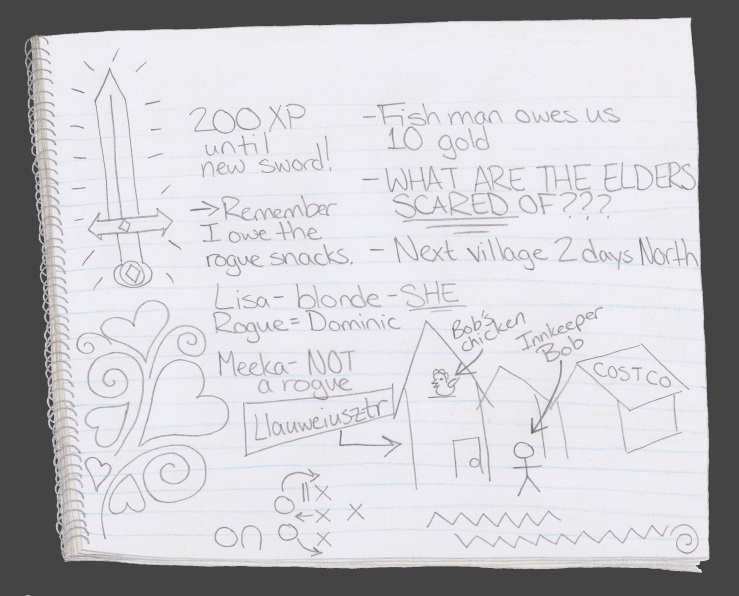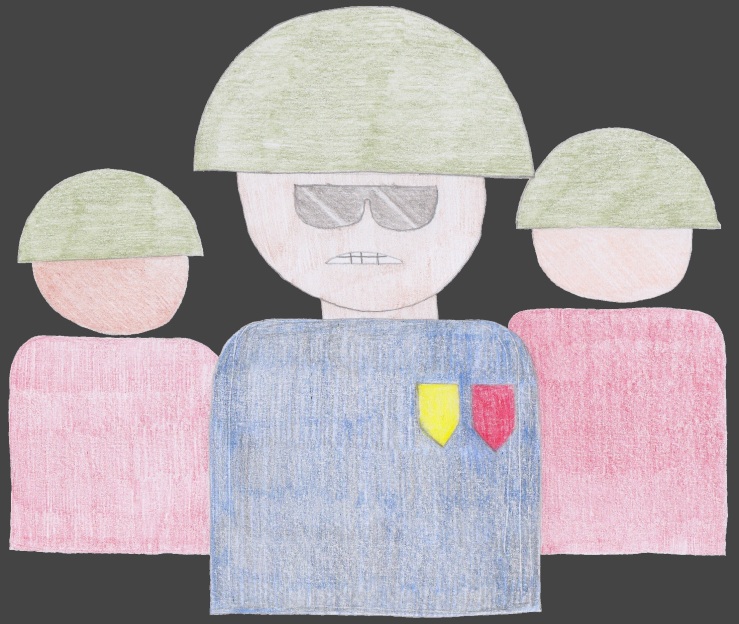Nerd social situations can be very different from more typical social situations. Aside from stereotypical geeky awkwardness, some unique group activities only occur in nerd circles. Thus: Nerdiquette. If you’re like me, you’re more comfortable doing new things when you have an idea of what to expect, and what’s expected of you. So for any of you who get invited to a game of D&D, or love what you’ve been hearing about your coworker’s Shadowrun game, or happen to walk into a local game store when they’re looking for Pathfinder players, here are some handy tips for what to expect in a tabletop rpg.
- Know what you’re getting into. Tabletop games are usually played in a series of sessions at regular intervals, such as weekly or biweekly. Many groups play for 3-5 hours at a time, and some are stricter than others about ending on time. Make sure to find out ahead of time about how long they expect to play, whether to bring food or money for food, how regularly they play, and, if you’ll be playing regularly, what to expect if you need to miss a session.

- Be on time, but don’t be surprised if you don’t start on time. An abiding problem with game groups is that everybody has to be there before the game can start. Do what you can to be part of the solution.
- The GM rules. The GM (or DM) is in charge of what happens in the game. They determine what rules are being used and how they are interpreted. Show respect to the GM, regardless of their age or experience. You should usually give the GM a chance to check your character over ahead of time to make sure everything is in order. Theoretically, the GM is also the authority on what kind of behavior is or isn’t allowed at the table. If you have problems with another player that you can’t resolve between the two of you, try talking to the GM.
- Be true to your character. Your character is more than just a fleshy sack of hit points. Characters with personality are more fun than characters that do whatever makes things easiest on the players. Having a clear idea of your character’s history and values helps you determine why they would do different actions or how they might make decisions. Try to avoid doing things the character has no believable motivation to do.

- About speaking in character: You may speak in character. (e.g. “Hail, Sir Knight! What news of the king?”) You may use the first person when speaking in character. (e.g. “I charge the dragon. Fear my blade, foul beast!”) In most groups, you may refer to player characters (PCs) by either the player’s name or the character’s name. However, if the GM is very strict, there may be a sharper divide between speaking in and out of character. (e.g. “Who’s Jeff? My name is Wizard Alcthazor!”) Sometimes this is signified by a gesture or manner of speaking. (e.g. [moose antlers] “Jeff, is there any more pizza?” [drops French accent] “Yeah, in the kitchen.”) Staying in character is fun!
- Players are not their characters. So you hate elves. That’s fine. That doesn’t mean that the dude playing an elf is a jerk. It’s fine to butt heads with another player’s character in game, as long as, at the end of the day, you’re still a couple of nerds having fun.

- Player Characters are special. Sometimes your character won’t have a clear reason to cooperate with or try to save the other players’ characters. This is the exception to the rule of staying in character. Try to be someone the rest of the people at the table want to play with. If your character doesn’t have a reason to help the others, invent one. It’s also considered extremely bad manners to ever leave another PC for dead.
- Ask questions. Ask all the questions. Nobody knows all the rules, and there might be house rules besides. It’s better to just ask than to assume incorrectly and be disappointed or confused later.
- If it helps you, take notes. These are especially helpful in mystery- or strategy-based games, where information that seems incidental turns out to be relevant. It can also be a discreet memory-assist for remembering the correct names and pronunciations for people and characters. Besides that, a GM is sure to be impressed and grateful when you refer to their gothic fantasy village by its actual name.

- Resist Commander Syndrome. It can be tempting to let one player take control of the table. Just because one powergamer acts like they know all the rules doesn’t mean you’re obligated to take their advice. The GM has final say on the rules and rules interpretations, and you have final say on your character’s (conscious or intended) actions. (If you’re the powergamer at your table, be aware of whether you’re overwhelming the other players or the GM. I know it can be hard to see others working through decisions, so practice being chill – it’s something of a learned skill.)

- Try things. New players especially might be wary of initiating in-character actions or conversations. The first few times I played, my character mostly just followed the group around and did what he was told. But the game is much more fun when you attempt to use your character’s particular abilities or invent strategies of your own. Your fellow players will appreciate how you contribute to the group dynamic.
- It’s about the narrative. It’s easy to get bogged down focusing on “winning” (usually defined as “attacking dangerous creatures without dying, then getting lots of money.”) I’m not saying this is strictly a bad thing, but most games are more interesting with characters that occasionally make choices that don’t gain them any loot, or take bad risks for good reasons, or have heroic last stands.
Every group is a little different, so sometimes these pieces of advice might not apply. Please take them as suggestions. Getting used to a new game involves some trial and error and mistakes, and that’s okay. A big list like this probably looks overwhelming, but I really hope it brings people in rather than keeping them away. This is Nerdiquette: tips intended to make you feel more comfortable among nerds.
We all know how it feels to be excluded. We know what it’s like to not fit in, so we are welcoming. We use kind words. We respect each other. We help each other learn to play games, interact with people, and develop creative skills. When one of us gets excited about something, we all do. We do not exclude anyone because of perceived intelligence, abilities, nerd credentials, or social status, whether low or high; nor because of any aspect of identity or experience. We make an effort to understand each other. We encourage each other. We are a nerd community. If you want to, you belong here.
Great Article, gonna share with the masses
LikeLike
A few more from a CoC Keeper…
Please try to respect the GM/Keeper/DM/Whatever Name Your System Uses, especially in terms of atmosphere. We all like to joke at the table, and we all like to have fun, but please, when the Keeper is describing the corpse of Algernon the NPC as a means of scaring the players, it’s really bad form to make a “Flowers for Algernon” joke as she’s doing the describing. At least save it for after the description is over.
Not every system is D&D. Learn the rules of the game you’ll be playing beforehand, or at least learn some of the basic setting. I obviously don’t expect you to have read any Lovecraft to play CoC (though it arguably helps), but at least be aware it’s a horror game that involves alien monstrosities that can kill you with a blink. I’ve had players try to approach CoC like it’s D&D, then be shocked and upset when I don’t let them do whatever they want. No, you can’t shoot Hastur in the face and get away with it, he’s not a dragon and his damage bonus is several times what your hit points, CON, and SAN can take in one sitting. No, you cannot tame a Hound of the Tindalos. Yes, there is a reason I didn’t let you throw dynamite at a byakhee in a hotel full of people. No, it’s not because I didn’t want you to have fun or I am a “bad GM”. This isn’t just me being mean, this is stuff that is in the rules. There is a reason for you not being able to do certain things. Make an effort to understand why that is the case.
Yes, I understand all the bad guys have the same handwriting because I hand-made the prop letters, and that may or may not “ruin” your immersion. Please, grow a thicker skin to this. There is only so much I can do; I’m not a master forger. Please respect this, I put a lot of effort into prop-making, sometimes even including actual blood, sweat, and tears (Seriously, I cut myself with an exacto blade making a Cthulhu idol once). If you find my props that bad, make them yourself and we’ll see how you fare.
Awesome as I am, it might surprise you to know that I am not actually Nyarlathotep and I cannot actually see the future with my Awesome Eldritch Reality-Warping Powers. Even in the case of simply telling the story, I make mistakes because I am a human being. Obviously, don’t nitpick rules, but this applies to there being plot holes and occasional missteps as well. Criticizing someone for forgetting a detail they thought they mentioned, or needing to retcon something, is not only very rude but incredibly poor form. Don’t be That Guy.
LISTEN to others at the table. If someone has a concern with you, respect that concern. If the group does not want to do something you want to do, respect that. You do not need to be the group quirky guy, or funnyman, or badass, just like you don’t need to be the group leader – in fact, everyone finds those people super annoying and distracting. The world of CoC is brutal enough without people being inattentive and not working together. Character tensions are fine and appreciated for drama, and I’ve had some damn great scenes with IC tensions – as long as it’s in character and not with two players.
More so than in any other RPG, the goal of CoC is NOT to “win”. The goal of CoC is to tell a story, solve a mystery, investigate the unknown, and go mad trying to survive. Denial is not a river in Egypt; do not come crying to me if your Investigator dies, have another on standby. Your character is squishy, not a magnificent wizard. Will I do all I can to keep you from being stupid and offing yourself by warning you? Yes. Will I protect your character from all death and bad things? No. Bad things happen in real life sometimes, and the dice are fickle. In CoC, there is a higher proportion of badness than normal and the dice are even more fickle.
Your Investigator being Temporarily or Indefinitely Insane is not an excuse to throw manners out the window. Be a decent person, even when your character really isn’t. Just because Tommy Muldoon is now a paranoid wreck that tries to stab the others in their sleep does not mean you need to be aggressive for real. Make a distinction between IC and OOC, and keep it that way.
LikeLike
Thanks for sharing your experience, laughingfish13. In the spirit of a 101 (beginner-level) course, could you say what CoC, IC, and OOC stand for?
LikeLike
“Call of Cthulhu”, “in character”, and “out of character”, respectively.
LikeLike